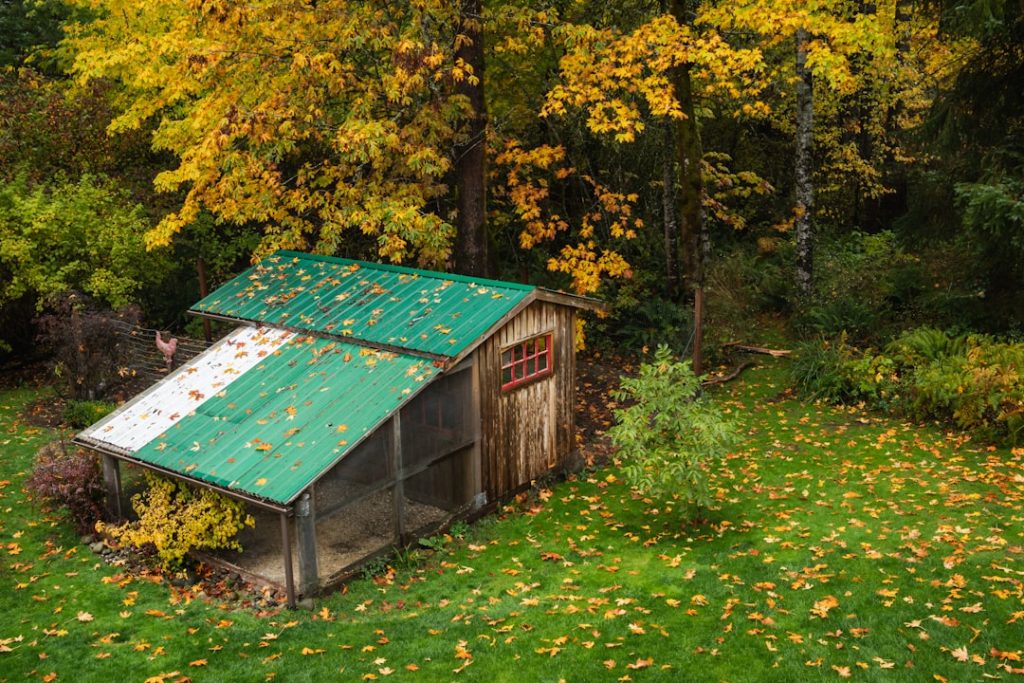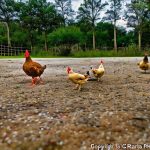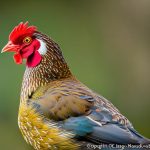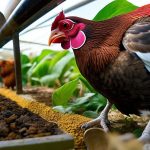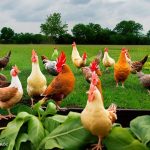Free-range chicken keeping offers numerous advantages for both the chickens and their owners. These birds can engage in natural behaviors like scratching, pecking, and dust bathing, which promotes their overall health and well-being. This improved quality of life often results in higher-quality eggs and meat, as well as reduced stress and aggression within the flock.
Free-range chickens also benefit from a more diverse diet, including insects, grass, and other natural forage, which can enhance the nutritional value of their eggs and meat. The practice of keeping free-range chickens can have positive environmental impacts. These birds naturally control pests such as slugs, snails, and insects, potentially reducing the need for chemical pesticides in gardens.
Their manure serves as an effective natural fertilizer, improving soil quality. Free-range chickens also contribute to sustainability by consuming kitchen scraps and leftovers, thereby reducing food waste. However, free-range chicken keeping does present certain challenges.
Predators like foxes, raccoons, and birds of prey can threaten the flock, necessitating protective measures. Additionally, free-range chickens may face an increased risk of contracting diseases or parasites from wild birds or other animals. Despite these challenges, proper care and management can mitigate these issues, allowing owners to reap the benefits of keeping free-range chickens on their property.
Table of Contents
- 1 Choosing the Right Breeds for Your Property
- 2 Creating a Safe and Secure Environment for Your Chickens
- 3 Feeding and Caring for Free-Range Chickens
- 4 Managing Health and Wellness for Your Flock
- 5 Maximizing Egg Production and Harvesting
- 6 Integrating Chickens into Your Sustainable Lifestyle
- 7 FAQs
- 7.1 What are the benefits of keeping free-range chickens on your own land?
- 7.2 What do free-range chickens need to thrive on your land?
- 7.3 What are some considerations for keeping free-range chickens on your own land?
- 7.4 How can I ensure the welfare of free-range chickens on my land?
- 7.5 What are some common challenges of keeping free-range chickens on your own land?
Key Takeaways
- Free-range chickens provide natural pest control and fertilization for your property
- Consider factors such as climate, space, and egg production when choosing chicken breeds
- Secure coops and fencing are essential for protecting chickens from predators
- A balanced diet of grains, greens, and insects is important for free-range chickens
- Regular health checks, vaccinations, and parasite control are crucial for maintaining a healthy flock
Choosing the Right Breeds for Your Property
Climate and Environment
The climate and environment in which you live are crucial considerations. Certain breeds thrive in cold climates, while others excel in warmer temperatures.
Space and Purpose
The amount of space available on your property is another vital factor. Some breeds are well-suited to free-ranging and foraging, while others are better suited to confinement or smaller spaces. Additionally, you should consider the purpose of keeping chickens. If you’re primarily interested in egg production, choose breeds known for their high egg-laying capabilities. For meat production, opt for breeds that grow quickly and have a good meat-to-bone ratio. Some breeds are dual-purpose, suitable for both egg and meat production.
Temperament and Availability
The temperament of the breeds you’re considering is also essential. Some breeds are known for being docile and friendly, while others may be more flighty or aggressive. Furthermore, consider the availability of the breeds in your area and whether they’re well-suited to your specific property and management practices.
By carefully weighing these factors, you can select the perfect breeds for your property, ensuring a successful and rewarding experience with your free-range chickens.
Creating a Safe and Secure Environment for Your Chickens

Creating a safe and secure environment for your free-range chickens is essential for their health and well-being. One of the first steps in creating a safe environment is to provide adequate fencing to protect the chickens from predators. This may include burying wire mesh underground to prevent digging predators from gaining access to the coop or run.
Additionally, it’s important to provide secure housing for the chickens at night to protect them from nocturnal predators such as foxes or raccoons. In addition to protecting the chickens from predators, it’s important to provide a clean and comfortable living environment for them. This includes providing adequate space for the chickens to roam and forage, as well as providing shelter from the elements such as sun, wind, and rain.
It’s also important to provide access to fresh water and nutritious feed at all times to ensure the health and well-being of the flock. Furthermore, it’s important to regularly inspect the chicken coop and run for any potential hazards or weaknesses that could compromise the safety of the chickens. This may include repairing any holes in the fencing, securing latches on doors and windows, and removing any potential hazards such as sharp objects or toxic plants from the environment.
By taking these measures, you can create a safe and secure environment for your free-range chickens, allowing them to thrive and flourish on your property.
Feeding and Caring for Free-Range Chickens
Feeding and caring for free-range chickens requires careful attention to their dietary needs and overall well-being. While free-range chickens have access to natural forage such as insects, grass, and seeds, it’s important to supplement their diet with a balanced feed to ensure they receive all the necessary nutrients. This may include providing a commercial layer feed for hens laying eggs or a broiler feed for meat-producing chickens.
Additionally, providing access to grit is important for chickens to aid in digestion. In addition to providing a balanced feed, it’s important to ensure that the chickens have access to fresh water at all times. Chickens require a constant supply of clean water for drinking and regulating their body temperature, especially during hot weather.
It’s important to regularly clean and refill water containers to prevent contamination and ensure the health of the flock. Furthermore, caring for free-range chickens also involves monitoring their health and well-being on a regular basis. This may include observing their behavior and appearance for any signs of illness or injury, as well as providing regular health checks such as deworming and vaccinations as needed.
By providing proper nutrition, access to clean water, and regular health care, you can ensure that your free-range chickens remain healthy and productive on your property.
Managing Health and Wellness for Your Flock
Managing the health and wellness of your free-range chicken flock is essential for their long-term well-being and productivity. One of the key aspects of managing their health is preventing diseases through good biosecurity practices. This may include quarantining new birds before introducing them to the flock, regularly cleaning and disinfecting coops and equipment, and limiting exposure to wild birds or other potential carriers of disease.
In addition to preventing diseases, it’s important to provide regular health checks for your flock. This may include monitoring their weight, appearance, behavior, and egg production on a regular basis to identify any potential health issues early on. It’s also important to provide regular deworming treatments and vaccinations as recommended by a veterinarian to prevent common poultry diseases.
Furthermore, managing the wellness of your flock also involves providing a clean and comfortable living environment for them. This includes regularly cleaning coops and nesting boxes, providing adequate ventilation, and ensuring that the chickens have access to fresh water and nutritious feed at all times. Additionally, providing opportunities for natural behaviors such as scratching, pecking, and dust bathing can contribute to their overall well-being.
By implementing good biosecurity practices, providing regular health checks, and maintaining a clean and comfortable living environment for your flock, you can effectively manage the health and wellness of your free-range chickens, ensuring their long-term productivity and well-being on your property.
Maximizing Egg Production and Harvesting

Nutrition for Optimal Egg Production
One of the key factors in maximizing egg production is providing a balanced diet that meets the nutritional needs of laying hens. This may include providing a commercial layer feed that is high in protein and calcium to support egg production.
Creating a Comfortable Environment
In addition to providing a balanced diet, it’s important to create a comfortable environment that encourages natural behaviors such as nesting and egg laying. This may include providing clean nesting boxes with soft bedding material where hens can lay their eggs in privacy. Providing access to fresh water at all times is also essential for maintaining egg production.
Health and Well-being
Maximizing egg production also involves monitoring the health of the hens on a regular basis. This may include providing regular health checks and addressing any potential health issues that could impact egg production. Additionally, providing opportunities for natural behaviors such as foraging and dust bathing can contribute to the overall well-being of the hens and support consistent egg production. Regularly collecting eggs from the nesting boxes can also prevent broodiness or egg eating among the flock.
Integrating Chickens into Your Sustainable Lifestyle
Integrating chickens into your sustainable lifestyle can provide numerous benefits for both you and the environment. One of the key ways in which chickens can contribute to sustainability is through their ability to reduce food waste by consuming kitchen scraps and leftovers. This not only reduces waste going into landfills but also provides nutritious food for the chickens at no additional cost.
Furthermore, integrating chickens into your sustainable lifestyle can also contribute to soil health through their natural foraging behaviors. Chickens are natural foragers and can help control pests such as slugs, snails, and insects in your garden while also enriching the soil with their manure. Their manure provides valuable nutrients that can improve soil fertility and support healthy plant growth.
In addition to reducing food waste and improving soil health, integrating chickens into your sustainable lifestyle can also provide a source of fresh eggs or meat for your family at home. This reduces reliance on store-bought eggs or meat that may have been produced using unsustainable practices or transported long distances. Overall, integrating chickens into your sustainable lifestyle can provide numerous benefits for both you and the environment by reducing food waste, improving soil health, and providing a sustainable source of fresh eggs or meat at home.
By carefully managing their care and environment on your property, you can enjoy the many rewards of keeping free-range chickens as part of your sustainable lifestyle.
If you’re considering keeping freerange chickens on your own land, you may want to check out this article on garden chicken coop ideas for some inspiration on how to create a comfortable and safe environment for your feathered friends. This article provides valuable tips and suggestions for setting up a coop that allows your chickens to roam and forage while still providing protection from predators.
FAQs
What are the benefits of keeping free-range chickens on your own land?
Keeping free-range chickens on your own land can provide several benefits, including access to fresh eggs, natural pest control, and the opportunity to engage in sustainable and ethical animal husbandry practices.
What do free-range chickens need to thrive on your land?
Free-range chickens need access to a secure coop for shelter, ample space to roam and forage, protection from predators, a balanced diet, and clean water to thrive on your land.
What are some considerations for keeping free-range chickens on your own land?
Considerations for keeping free-range chickens on your own land include local zoning regulations, predator control measures, proper waste management, and the potential impact on neighboring properties.
How can I ensure the welfare of free-range chickens on my land?
To ensure the welfare of free-range chickens on your land, provide adequate shelter, access to fresh water and nutritious feed, regular health checks, protection from predators, and a clean and safe environment for foraging.
What are some common challenges of keeping free-range chickens on your own land?
Common challenges of keeping free-range chickens on your own land may include predation, disease management, maintaining a balance between foraging and protecting crops, and addressing potential conflicts with neighbors.
Meet Walter, the feathered-friend fanatic of Florida! Nestled in the sunshine state, Walter struts through life with his feathered companions, clucking his way to happiness. With a coop that’s fancier than a five-star hotel, he’s the Don Juan of the chicken world. When he’s not teaching his hens to do the cha-cha, you’ll find him in a heated debate with his prized rooster, Sir Clucks-a-Lot. Walter’s poultry passion is no yolk; he’s the sunny-side-up guy you never knew you needed in your flock of friends!

